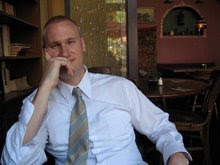 During the shooting of their documentary, Restrepo, filmmakers Sebastian Junger and Tim Hetherington spent 14 months following a company of soldiers in one of the most dangerous parts of Afghanistan, the Korangal Valley.
During the shooting of their documentary, Restrepo, filmmakers Sebastian Junger and Tim Hetherington spent 14 months following a company of soldiers in one of the most dangerous parts of Afghanistan, the Korangal Valley.Restrepo received numerous accolades for its candid and unabashed portrayal of US soldiers fighting not for pride and country (the shot up, mangled face of your best friend after a 360 degree ambush quickly dispels such childish notions), but for each other.
There was much that was depicted in the film; the unflinching determination of bare-chested soldiers digging an outpost while alternately taking fire from unseen enemies, the blank-faced paranoia of soldiers sensing an impending attack during an early morning reconnaissance mission, and the reaction of soldiers when stumbling across the charred remains of dead Afghani children after an air run gone wrong.
I was also impressed by the people not shown, namely, Mr. Junger and Mr. Hetherington. Too many documentary filmmakers ruin an otherwise good production through self-promotion, placing themselves at the center of attention, as if to assert the indispensable nature of their extraordinary investigative cunning and fortitude, showcased through any number of gratuitous action cams and idiotic, tongue flailing displays of socially disruptive behavior. No, Mr. Junger and Mr. Hetherington work quietly behind the scenes, near anonymous participants engaged in the harrowing job of capturing humankind's ultimate act of primordial barbarity, war.
In contrast, there is poet Elyse Fenton whose collection of war poetry, inspired by her husband's experience as an Army medic in Iraq, was awarded the University of Wales' Dylan Thomas Prize. Garnering $47,000 for her work, an impressive amount for any modern day poet, she is also the first American to claim the prize.
 When I first heard about this on NPR, I was happy not only for the fact that a poet was receiving media attention, but also for the fact that it was a discussion offering a window into the range of emotions experienced by a husband and wife separated by war.
When I first heard about this on NPR, I was happy not only for the fact that a poet was receiving media attention, but also for the fact that it was a discussion offering a window into the range of emotions experienced by a husband and wife separated by war.But excitement and interest soon dissolved into disillusionment.
Allow me to preface. It's not that Elyse Fenton is a poor writer. In fact, she is an excellent poet, whose verse, imagery, and tone are consistently strong. No doubt, what she has achieved stylistically is most certainly worthy of praise. Rather, what disturbs me is the questionable source of her inspiration, and the poetic license that she seems to have taken.
On December 22, 2010, NPR's Susan Phillips interviewed Elyse Fenton and her husband Peenesh Shah. After introducing the poetic merits of Elyse Fenton, Phillips quickly addresses the growing controversy surrounding Fenton's work. Namely, the authenticity of Fenton's reflections on the anxiety and emotional stress experienced as a result of her husband's deployment.
"Shah worries about how other soldiers may view the poems. He says he was safe for the most part and didn't see combat. And he struggles with the idea that he was his wife's muse."
Apparently, Mr. Shah was a Green Zone Army medic.
Put simply, he never saw combat and was seldom, if ever, in danger of losing his life. So why, despite Shah's repeated insistence on his safety, did Fenton persist in dramatizing her emotions, labeling herself a "war bride"?
Staking fencing along the border of the spring
garden I want suddenly to say something about
this word that means sound and soundlessness
at once. The deafening metal of my hammer strikes
wood, a tuning fork tuning my ears to a register
I’m too deaf to understand. Across the yard
each petal dithers from the far pear one white
cheek at a time like one blade of snow into
the next until the yard looks like the sound
of a television screen tuned last night to late-
night static. White as a page or a field where
I often go to find the promise of evidence of you
or your unit's safe return. But instead of foot-
prints in the frosted static there's only late-
turned-early news and the newest image of a war
that can't be finished or won. And because last
night I turned away from the television's promise
of you I'm still away.
According to Fenton, it was the uncertainty and awareness of war that inspired her poetry. Cast in this light, isn't Fenton's emotional response justifiable? After all, her husband was thousands of miles away, subject to the unpredictable whims of war-mongering politicians and their eager-to-please generals, and the steady ticker of IED casualties steadily scrolling across the bottom of every major news channel.
I'll therefore temper my own criticism, and allow one of her husband's comments to speak for itself:
Mr. SHAH: Whenever I hear Elyse talk about her work, I think about the potential of my peers, people with whom I had served, hearing it and what they would think. And I have no regard for what poets or the academy might think
(as an alternative, check out the poetry of Iraqi war veteran Brian Turner)
